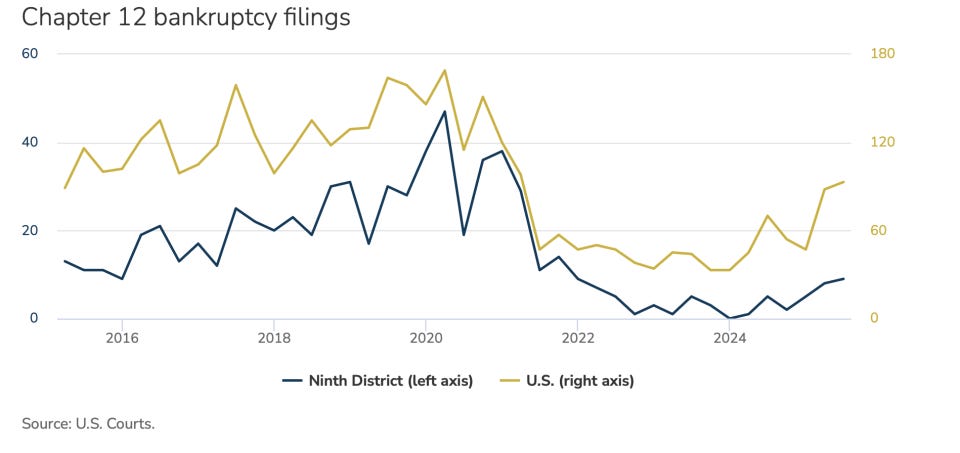When Trade Wars Hit Home: How Tariffs Broke the Heartland
Farm bankruptcies are up
American soybean farmers are hurting badly. Tariff policy has hit them hard.
In 2024, the U.S. exported more than $30 billion worth of soybean products, according to the Department of Agriculture. But here’s the problem: U.S. farmers produce 40% more soybeans than we use domestically. The rest needs to be exported.
For decades, China has been the top buyer, purchasing around a third of all U.S. exports, that’s roughly $12 billion worth last year. This year, however, China has bought zero.
The White House blames China for retaliating against American farmers, while farmers see it differently.
It’s unfortunate that Chinese leadership has decided to use American soybean farmers as a hostage or pawn in trade negotiations,
Treasury Secretary Scott Bessent told CNBC.
But farmers on the ground aren’t looking for sympathy. As one told CNN, “We don’t want aid, we want trade.”
We Don’t Want Aid, We Want Trade
And that’s what economists mean when they say the U.S consumer will pay the tariffs. Farmers are having to ask for help, while taxpayers are footing the bill for bailouts and paying higher prices for imported goods. It’s another example of how tax dollars shift from cities to farmland when trade policies backfire.
The Economics
China’s avoidance of U.S. soybeans didn’t happen overnight. When the first tariffs were introduced in 2017, China began hedging its bets by investing heavily in Argentina and Brazil, building new supply chains, and reducing its dependence on the United States.
Those supply chains are now mature and resilient. In economic terms, this phenomenon is known as path dependence; once a new trade route is established and trusted, it’s rarely reversed. Even if tariffs were lifted tomorrow, China no longer needs U.S. soybeans. The U.S. tariff policy compelled China to reorient its trade supply chains by seeking new markets that were more reliable and less expensive.
That’s why this current shock hurts so much. Farmers aren’t just facing temporary losses; they’re watching their markets permanently shift abroad.
And the numbers are starting to show it. According to the Federal Reserve Bank of Minneapolis, there were 93 farm bankruptcy filings in the second quarter, up from 88 in the first quarter, and nearly double the 47 filings at the end of 2024.
It’s not yet a repeat of 2020’s high of 169, but the trend is unmistakable: bankruptcies are rising again, and the safety nets are wearing thin.
The Bottom Line
Trade wars are designed in Washington, but the pain is felt in the heartland and in your wallets.
The lesson here is that traders like certainty. When threatened, they will begin to find alternatives. When supply chains shift, they rarely shift back. China spent nearly a decade building alternatives to U.S. soybeans, and those relationships now define global agriculture.
For U.S. farmers, this isn’t just about tariffs; it’s about their survival. Some will adapt and find new buyers, while others may not survive to see the next season. The economic and emotional pain of failure will have long-term implications.
Meanwhile, taxpayers pay the price for both sides of the policy: higher prices at the store and costly bailouts for the fields.
In the long run, this story isn’t just about soybeans. It’s about how global supply chains remember, and how easily America can forget that once a buyer moves on, they rarely come back. Tariff policies should be strategically developed, as their ramifications will last for generations.
Did you learn something new?
Share this issue and invite others to join the Decode Econ community—where we make sense of the economy, one story at a time.



It's readily apparent that the current Administration lacks a fundamental understanding of a Pareto Inefficiency. Farmers have been maximizing their output to meet the demands of export to China and with the changing tariff structures, cheaper alternatives stepped in. (There's some political choice and re-alignment of partnerships that have resulted most would presume will endure until either another poltical change or product disruption.)
Amusingly the subsidies that Trump will have to use to make whole farmers are antithetical to the tenets of Captialism and more aligned with Socialism (but don't tell them that).
This is yet another example of what happens we are no longer a trustworthy partner. And why the damage created here is going to last a long time. A new administration will not instantly right the ship